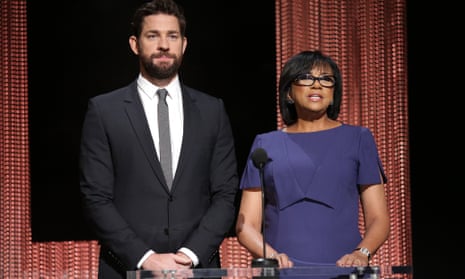Cheryl Boone Isaacs, president of the Academy of Motion Picture Arts and Sciences, has responded to the controversy surrounding this year’s all-white Oscar nominations and confessed to being disappointed about the lack of diversity.
Snubs for Idris Elba, Benicio del Toro, Rocky reboot Creed and NWA biopic Straight Outta Compton have been seen as frustrating backward steps after last year’s nominations also failed to include David Oyelowo for Martin Luther King drama Selma, or any other actors of colour.
“Of course I am disappointed, but this is not to take away the greatness [of the films nominated],” she told Deadline. “This has been a great year in film, it really has across the board. You are never going to know what is going to appear on the sheet of paper until you see it.”
After last year’s nominations led to the notorious hashtag #OscarsSoWhite trending, the Academy has made a public effort to increase diversity with a more varied set of board candidates, including snubbed Selma director Ava DuVernay, and bringing back Chris Rock as host for this year’s ceremony. Last November, Boone Isaacs also announced a five-year plan that will involve the Academy and studios working together to ensure that executives ensure a broader pool of talent when hiring.
But she admits: “We have got to speed it up.”
The year’s overwhelmingly white list of nominees, including favourites Leonardo DiCaprio and Brie Larson, have come as a surprise. Elba, who has been nominated for three Screen Actors Guild awards and was up for two Golden Globes, was seen as a surefire best supporting actor candidate for his role in Beasts of No Nation. The actor was also nominated for a Bafta last week.
A chance to have some diversity was missed with Straight Outta Compton’s sole nomination handed to the film’s white screenwriters. Similarly, Creed, Ryan Coogler’s vibrant millennial reboot of the Rocky franchise, was nominated for only one Oscar: best supporting actor for the film’s one white star, Sylvester Stallone. The last time black actors were in the race was in 2013 with Chiwetel Ejiofor and Lupita Nyongo playing slaves in 12 Years a Slave and Barkhad Abdi playing a Somali pirate in Captain Phillips.
The announcement has caused yet more outrage on Twitter. Civil rights activist and talk show host Al Sharpton called the industry “fraudulent” and said that “direct action” is needed to correct the problem while Golden Globes host Ricky Gervais jokingly asked why the Academy read out “all the white nominees first”
April Reign, the creator of #OscarsSoWhite, said she was “disappointed, but not surprised”.
“It tells me that the industry isn’t interested in changing the status quo and that there is a mistaken assumption that only movies about straight white males will bring in moviegoers,” she told the Los Angeles Times.
“Obviously this is a for-profit business, and I absolutely understand that. But at the same time, look at Star Wars: The Force Awakens, which has now grossed over $1bn and is one of the highest-selling films of all time – with a female lead and a black lead. So, don’t tell me that people of colour, that women cannot fill seats because Star Wars has proven that wrong.”
In the US, ethnic minorities make up 46% of the cinema-going audience and some of 2015’s biggest US hits have reflected the country’s racial diversity more than ever, notably with Fast & Furious 7’s refreshingly mixed group of actors. But even that film, which Vin Diesel wildly predicted would sweep the board at the Oscars, was snubbed in one key category: best original song. See You Again, Wiz Khalifa’s ode to Paul Walker, was seen as a lock for the category, one of the few that often rewards black talent.
Given the ceremony’s choice of host, the outspoken comic Chris Rock, it’ll be a nervous night for Academy bigwigs. In 2014, Rock wrote a frank essay for The Hollywood Reporter where he referred to Hollywood as “a white industry” that remains unchanged at the top. “How many black men have you met working in Hollywood?” he wrote. “They don’t really hire black men. A black man with bass in his voice and maybe a little hint of facial hair? Not going to happen. It is what it is.”
If last year’s host Neil Patrick Harris was brave enough to reference the race of the nominees, Rock will undoubtedly skewer the old white men who have made it another uniform contest. The Academy has six weeks to PR its way out of this one.

Comments (…)
Sign in or create your Guardian account to join the discussion